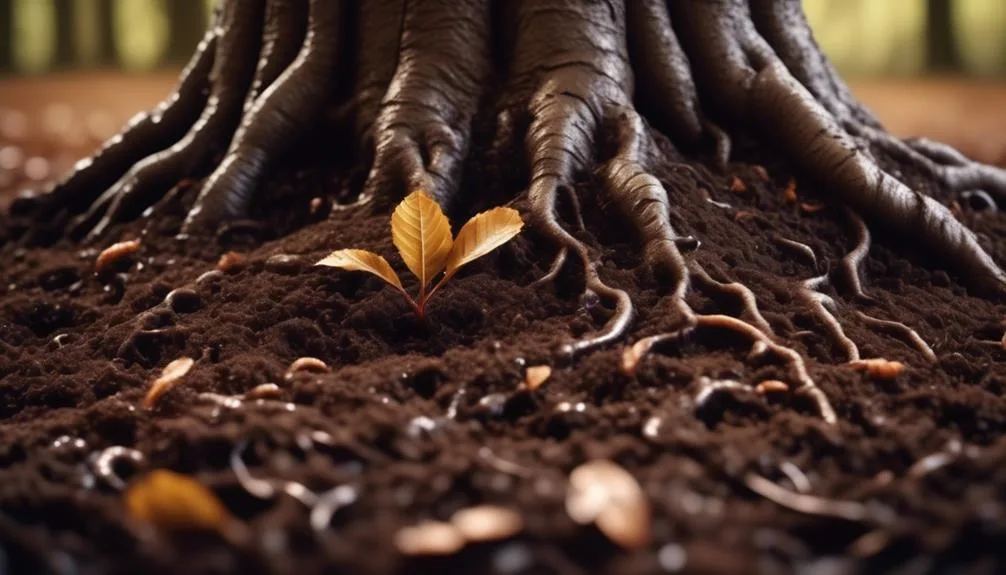Enhancing the soil for beech trees is crucial for their well-being. By ensuring that the soil has the right nutrients and pH balance, you can support the health of these magnificent trees.
In this article, we will explore practical methods for improving the soil, such as conducting soil tests and adding organic matter. These steps will not only benefit the beech trees but also contribute to the overall ecosystem.
Join us as we delve into the essential ways to optimize soil for beech trees.
Soil Testing
Before planting beech trees, it's essential to conduct a soil test to assess the nutrient levels and pH balance of the soil. Nutrient analysis is crucial to understand the soil composition and determine if any deficiencies exist. A comprehensive soil test will reveal the levels of essential nutrients such as nitrogen, phosphorus, and potassium, which are vital for the healthy growth of beech trees.
Additionally, understanding the soil composition will help in making informed decisions about any necessary amendments or fertilizers. The pH balance of the soil is also a critical factor, as beech trees thrive in slightly acidic to neutral soil.
Ph Adjustment
Assessing and adjusting the pH level of the soil is crucial for creating an optimal environment for the healthy growth of beech trees. Beech trees thrive best in slightly acidic to neutral soil with a pH range of 5.5 to 7.5.
If your soil is too acidic, with a pH below 5.5, consider applying lime to raise the pH level. Lime application helps to neutralize acidic soil, making it more suitable for beech trees. It's important to perform a soil test before applying lime to determine the amount needed for effective pH adjustment.
Adding lime in the recommended quantity will help balance the soil's acidity, creating a favorable growing environment for beech trees. By adjusting the pH level, you can significantly enhance the overall health and vitality of your beech trees.
Organic Matter Addition
Once you've adjusted the pH level of the soil, enhancing it with organic matter is crucial for fostering the optimal growth conditions for your beech trees.
One effective method for organic matter addition is through compost application. Compost is rich in nutrients and beneficial microorganisms, which can greatly improve the soil structure.
When adding compost, ensure it's well-rotted to avoid nitrogen tie-up during decomposition. This will provide a slow release of nutrients, promoting long-term soil health. Additionally, the organic matter in compost helps to improve water retention and aeration, which are essential for beech tree growth.
The nutrient enrichment from organic matter also encourages beneficial microbial activity in the soil, creating a more favorable environment for the trees.
With these benefits, incorporating compost into the soil can significantly enhance the overall health and vigor of your beech trees.
Mulching Techniques
Enhance the soil around your beech trees by applying mulch to improve moisture retention and suppress weed growth. When applying mulch, ensure it's spread evenly around the base of the tree, creating a layer about 2-4 inches thick. This will help to retain moisture, which is essential for the beech trees' root development.
Additionally, the mulch layer acts as a barrier, preventing weeds from growing and competing with the trees for nutrients. As the mulch decomposes, it also contributes valuable organic matter to the soil, enhancing its structure and fertility. This aids in nutrient absorption, supporting the overall health and growth of the beech trees.
Choose organic mulch, such as wood chips or shredded leaves, as they gradually release nutrients into the soil as they break down, providing long-term benefits to your beech trees.
Watering and Drainage
To ensure the optimal health and growth of your beech trees, maintaining proper watering and drainage is crucial. The soil composition and irrigation methods play a significant role in the overall well-being of your trees. Here's what you need to know:
- Soil Composition: Beech trees thrive in well-draining soil with a pH level between 6.0 and 7.5. Sandy loam or loamy soil types are ideal for proper drainage and water retention.
- Irrigation Methods: When watering your beech trees, aim for deep, infrequent watering rather than frequent shallow watering. This encourages deep root growth and helps the trees withstand dry periods. Consider using a drip irrigation system or soaker hoses to deliver water directly to the root zone.
Maintaining the right soil composition and utilizing appropriate irrigation methods will ensure that your beech trees receive the necessary moisture for healthy growth.
Conclusion
Incorporating these soil improvement techniques will create an optimal environment for beech trees to thrive. By testing the soil, adjusting pH levels, adding organic matter, employing proper mulching, and ensuring adequate watering and drainage, you can significantly enhance the health and vitality of your beech trees.
These simple yet impactful steps can make a profound difference in the long-term well-being of these majestic trees.

My interest in trees started when I first saw the giant sequoias in Yosemite.
I was a teenager then, and I remember thinking, “I need to learn more about this.”
That moment stuck with me.
A few years later, I went on to study forestry at Michigan Tech.
Since graduating, I’ve worked in a mix of hands-on tree care and community education.
I’ve spent over ten years helping people understand how to plant, maintain, and protect the trees in their neighborhoods.
I don’t see trees as just part of the landscape.
They are living things that make a real difference in our daily lives.
